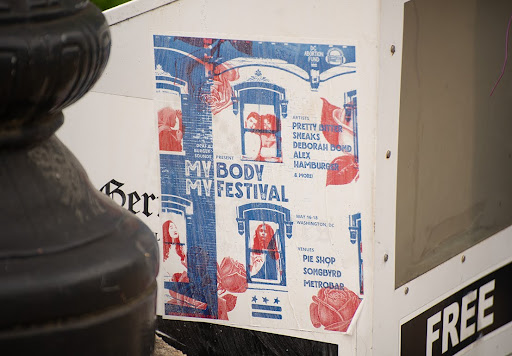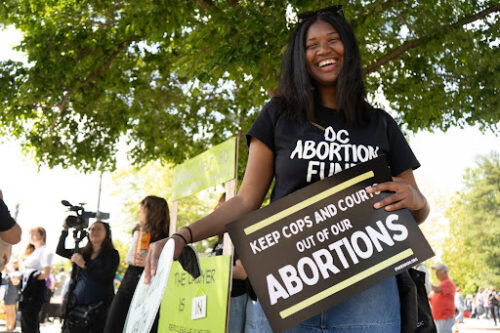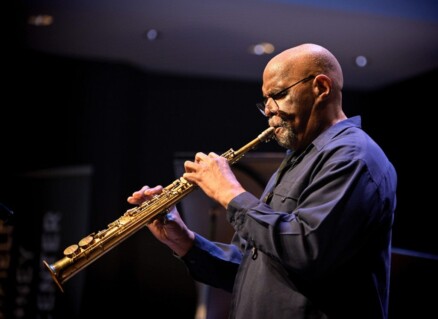My Body, My Festival taps D.C.’s many music scenes in support of abortion access

D.C.-based flutist and composer Alex Hamburger believes passionately in the cross-section between advocacy and art, a conviction that drove her to start My Body, My Festival, which benefits the DC Abortion Fund (DCAF) and features various artists from in and around the District.
The festival returns this week for its second straight year, bringing an eclectic range of music — with a focus on top-tier women artists based in the area — to three popular venues in Northeast D.C.: Pie Shop, Songbyrd and Metrobar.
In April 2023, the single-day debut of this event raised over $5,000 for DCAF. With enthusiastic support from the fund’s team, Hamburger decided to triple her effort this year. Shows will take place from Thursday, May 16, through Saturday, May 18. Night 1 is sold out, but tickets for Nights 2 and 3 — a singer/songwriter showcase at Songbyrd and a jazz and neo-soul spotlight at Metrobar, respectively — are still available.
The diversity of the festival’s programming shows that “it’s not just one genre of music, area of the city, or type of venue that shows up for abortion rights,” DCAF communications manager Jade Hurley told CapitalBop.
“We hope for My Body, My Festival to be the ultimate stigma-buster,” Hurley said. “Marrying music and abortion felt intuitive to us. What better way to normalize and educate than to connect abortion access to things we all love — song, dance and our D.C. community?”
Veronica Faison, a singer-songwriter performing at the festival’s second night show at Songbyrd Music House, collaborated with DCAF earlier this year on a similar event: the girlgenius Songwriter Showcase and fundraiser in February.
“I’m thrilled that music will help showcase that the abortion movement — and the reproductive justice movement as a whole — is an inherently joyful one,” said Faison, who recently protested outside of the Supreme Court with DCAF during arguments for the still-percolating Moyle v. U.S. case, which could determine the extent of states’ rights to enforce abortion restrictions.
Pie Shop, which hosted the festival last year as a one-day event, will house the first night of this week’s festival, with a showcase of acts across the indie-pop and rock spectrum, including Pretty Bitter, Flowerbomb, Cherub Tree, and Outerloop.
On Friday — Night 2 of this year’s My Body, My Festival — Faison will perform at Songbyrd alongside other songsmiths like Sneaks, ViRG, Zawadi Carroll, and Devon Williams. Egyptian multi-hyphenate DJ Basbousa will close out the evening with a set starting at midnight.
Jazz takes center stage on the festival’s final night at Metrobar, featuring the Deborah Bond Duo; vocalist (and CapitalBop board member) Akua Allrich; “CONNECTED,” a collaborative project between bassist Richie Goods and vibraphonist Chien Chien Lu; pianist, vocalist and songwriter Amy K. Bormet, founder and director of the Washington Women in Jazz Festival; and festival organizer Hamburger, herself an ascendant star in the regional and national jazz scenes. Later that night, the festival will head down the street to Lost Generation Brewing Company for an afterparty featuring an all-vinyl set from DJ Laura Lopez.

In the months following the Dobbs v. Jackson Women’s Health Organization decision, which overturned Roe v. Wade, Hamburger felt called to do something to support women being forced into difficult situations to access healthcare. She decided to begin donating the proceeds from her band’s shows to the National Abortion Fund.
After one show at St. Vincent Wine raised more than $2,000, Hamburger found out about DCAF, and reached out to see if they would be interested in collaborating on an event.
“I was like, oh, DC Abortion Fund? I bet they would be down to be involved in this,” Hamburger told CapitalBop. “And the rest is history. That’s my team now!”
While the festival debuted as a one-night event, Hamburger said that Bormet — who helped organize and even name the first iteration of the festival — inspired her to expand it into a larger benefit this year, and to focus on celebrating locally based artists.
My Body, My Festival is a collaboration between Hamburger’s production company, Burger Sounds, and DCAF, which is the most prominent organization working in the DMV area to provide funding to people who need help affording access to abortion. DCAF is also one of the largest abortion funds in the nation.
As more restrictions on reproductive healthcare across the country have galvanized public support for abortion rights, funds like DCAF have had to drastically increase spending and outreach to compensate for the influx of new patients from more care-restrictive areas of the country who often require funding for travel and legal fees.
This influenced the festival’s organizers to expand the scope of both the festival programming and fundraising, seeking to raise more than $60,000 by the end of the weekend. They have already raised more than half via ticket sales and sponsorships.
In recent years, the District of Columbia has established itself as a champion of abortion rights and access, with a 2017 law passed by the D.C. Council banning regulatory discrimination against abortion providers and subsequent legislation introduced after the Dobbs decision making D.C. a safe haven for people in other states seeking reproductive healthcare.
However, Congressional interference has come between D.C. and self-determination on the issue. A federal amendment to the D.C. budget recently reimposed restrictions on Medicaid dollars being used for abortions in the District, requiring people to pay out-of-pocket for reproductive healthcare costs that can range from $500 to $20,000 depending on the patient’s stage of pregnancy.
Over the past couple of years, DCAF saw an influx of new abortion patients as abortion bans and restrictions became more prevalent across the country. These patients require increasing amounts of funding to secure reproductive healthcare due to travel and ever-rising procedural expenses.
According to Hurley, DCAF’s average pledge to abortion-seekers was $260 before Dobbs, a total that has since nearly tripled to $715. She said that the organization had pledged funding to patients from the District and more than 40 states in the past year.
So far in 2024, the organization has spent nearly $600,000 assisting almost 1,200 abortion seekers from across the nation. Last year, they spent $1.7 million.
Hurley sees the festival’s growth as being inextricably tied to the growing demand for reproductive healthcare in the DMV, as more states are denying local options to their residents.
She told CapitalBop that many of the festival’s sponsors and partners will be present at the events, and several will participate as vendors in a reproductive health resource fair at Metrobar during the final day of the festival.
Special-edition merchandise will be available at this week’s events; all proceeds from ticket and merchandise sales will go directly to the organization.
Hamburger and the festival’s other organizers are already toying with new ideas for next year’s edition. They have a shared vision of My Body, My Festival becoming an annual DC institution — something that everyone in the District knows about.
“I think after [this year’s festival], we’ll definitely take a couple months to debrief and see what happens next,” said Hamburger. “I think anything could happen.”
Alex Hamburger, DC, DC Abortion Fund, DC jazz, Deborah Bond, jazz, My Body My Festival, National Abortion Fund, Washington




